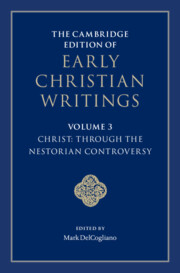Book contents
- The Cambridge Edition of Early Christian Writings
- The Cambridge Edition of Early Christian Writings
- The Cambridge Edition of Early Christian Writings
- Copyright page
- Contents
- Notes on Contributors
- Acknowledgments
- Note on the Texts and Translations
- Abbreviations
- Series Introduction
- Introduction
- Part I The Beginnings of Christology
- Part II Developing Christological Traditions
- Part III Traditions of Pro-Nicene Christology
- 21 Tome to the Antiochenes 7
- 22 Athanasius of Alexandria, Christological Letters to Epictetus, Adelphius, and Maximus
- 23 Apollinarius of Laodicea, Recapitulation
- 24 Apollinarius of Laodicea, Selected Letters
- 25 Apollinarius of Laodicea, On the Faith and the Incarnation
- 26 Apollinarius of Laodicea, On the Body’s Union with the Divinity in Christ
- 27 Apollinarius of Laodicea, Fragments of Other Writings
- 28 Apollinarius of Laodicea, Fragmentary Writings against Diodore and Flavian
- 29 Basil of Caesarea, Letters 261 and 262
- 30 Basil of Caesarea, Homily on the Holy Birth of Christ
- 31 Diodore of Tarsus, Selected Fragments
- 32 Gregory of Nazianzus, Letter 101 to Cledonius
- 33 Gregory of Nazianzus, Poems 1.1.10–11
- 34 Gregory of Nyssa, Oration on the Savior’s Nativity
- 35 Theodore of Mopsuestia, On the Incarnation of the Lord against the Apollinarians and Eunomians (Fragments)
- 36 Augustine of Hippo, On Eighty-Three Different Questions. Number 80: Against the Apollinarians
- 37 Augustine of Hippo, Letter 137
- 38 The Leporius Dossier
- 39 Theodoret of Cyrrhus, Exposition of the Orthodox Faith
- Part IV Controversy over Nestorius
- Suggestions for Further Reading
- Scriptural Index
28 - Apollinarius of Laodicea, Fragmentary Writings against Diodore and Flavian
from Part III - Traditions of Pro-Nicene Christology
Published online by Cambridge University Press: 05 February 2022
- The Cambridge Edition of Early Christian Writings
- The Cambridge Edition of Early Christian Writings
- The Cambridge Edition of Early Christian Writings
- Copyright page
- Contents
- Notes on Contributors
- Acknowledgments
- Note on the Texts and Translations
- Abbreviations
- Series Introduction
- Introduction
- Part I The Beginnings of Christology
- Part II Developing Christological Traditions
- Part III Traditions of Pro-Nicene Christology
- 21 Tome to the Antiochenes 7
- 22 Athanasius of Alexandria, Christological Letters to Epictetus, Adelphius, and Maximus
- 23 Apollinarius of Laodicea, Recapitulation
- 24 Apollinarius of Laodicea, Selected Letters
- 25 Apollinarius of Laodicea, On the Faith and the Incarnation
- 26 Apollinarius of Laodicea, On the Body’s Union with the Divinity in Christ
- 27 Apollinarius of Laodicea, Fragments of Other Writings
- 28 Apollinarius of Laodicea, Fragmentary Writings against Diodore and Flavian
- 29 Basil of Caesarea, Letters 261 and 262
- 30 Basil of Caesarea, Homily on the Holy Birth of Christ
- 31 Diodore of Tarsus, Selected Fragments
- 32 Gregory of Nazianzus, Letter 101 to Cledonius
- 33 Gregory of Nazianzus, Poems 1.1.10–11
- 34 Gregory of Nyssa, Oration on the Savior’s Nativity
- 35 Theodore of Mopsuestia, On the Incarnation of the Lord against the Apollinarians and Eunomians (Fragments)
- 36 Augustine of Hippo, On Eighty-Three Different Questions. Number 80: Against the Apollinarians
- 37 Augustine of Hippo, Letter 137
- 38 The Leporius Dossier
- 39 Theodoret of Cyrrhus, Exposition of the Orthodox Faith
- Part IV Controversy over Nestorius
- Suggestions for Further Reading
- Scriptural Index
Summary
The motivations behind Apollinarius of Laodicea’s Christology are debated by scholars, but it is safe to say that from the beginning he opposed any sort of dualist Christology.1 In Antioch, in whose ecclesiastical affairs Apollinarius was involved since the early 360s, two presbyters connected with the pro-Nicene Meletian faction, Diodore and Flavian, espoused a dyophysite Christology.2 Diodore became bishop of Tarsus in 378 and Flavian bishop of Antioch in 381. It seems that it was not until the late 370s that Apollinarius came into conflict with them, over issues that were as much as ecclesio-political as Christological. Fragments of Apollinarius’s writings against Diodore and Flavian are preserved in three later polemical treatises: Theodoret of Cyrrhus’s Eranistes, Leontius of Byzantium’s Adversus Fraudes Apollinaristarum, and the Doctrina Patrum de Incarnatione Verbi. These treatises mention a number of different Apollinarian sources for the fragments they preserve, but it is unclear if they refer to a single tract by Apollinarius or several. At least one of Apollinarius’s writings against Diodore was addressed to a certain Herakleion who is otherwise unknown (Fragments 117–120). No more than titles are known about the others, however many there were.
- Type
- Chapter
- Information
- The Cambridge Edition of Early Christian Writings , pp. 339 - 347Publisher: Cambridge University PressPrint publication year: 2022

